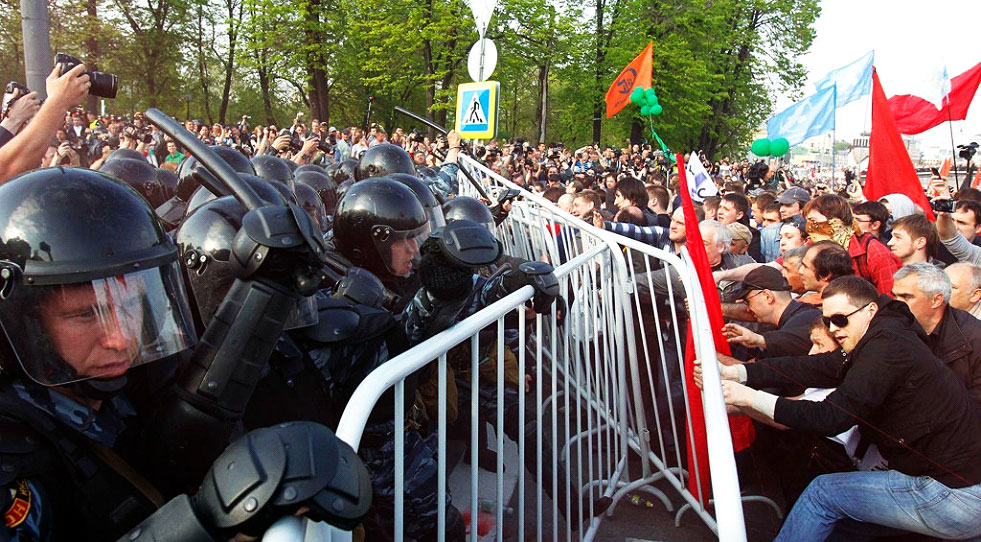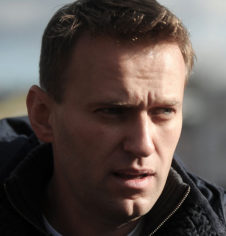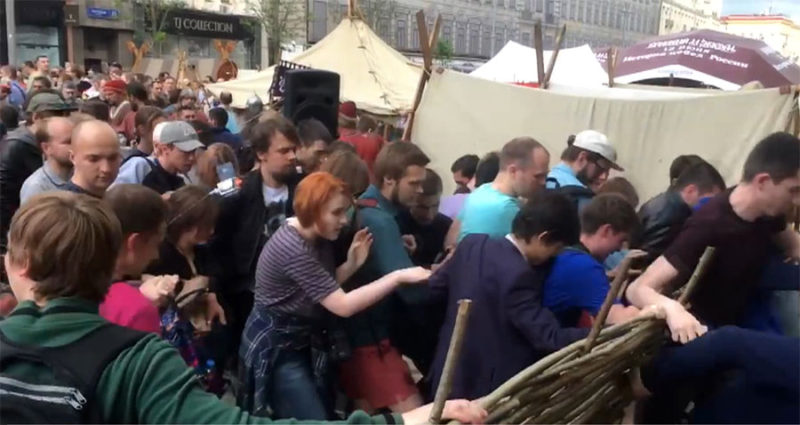Navalny: Russian Laurent Louis or an ordinary provocateur?
The Grand Chamber of the ECHR will meet in Strasbourg on January, 24 to review the case of Russian opposition leader Alexei Navalny, again, since on February, 2 2017 the ECHR had ruled in the Navalny vs. Russia case: there were violations, but no political motive by the state. Will the decision be the same now, after Navalny's bid for the presidency of the Russian Federation failed?
Published: January 23, 2018, 10:41 pm
However, the complaints of Navalny – perhaps, the most famous opposition in Russia, who has gained popularity with videos about corruption in the highest echelons of power ‒ do not deal with the election. During the first two years of Vladimir Putin’s third term (2012 to 2014) he had been charged with administrative penalties seven times for organising unauthorized rallies and participating in them. For the same violations, the punishment varied: five times he was fined, and put under 15 days of arrest after serving 7 days.
At that time the Court decided that Navalny’s rights to freedom and personal inviolability, to a fair trial and to freedom of assembly and association (articles 5, 6, 11 of the European Convention on Human Rights) were indeed violated. Why was Navalny not satisfied with the fact that the ECHR refused to recognise the political underpinnings of these actions by the Russian authorities in dismissing the charges of violations of articles 14 (“prohibition of discrimination”) and 18 (“limits of the use of restrictions on rights”) of this Convention.
Navalny insists: all this time he was persecuted as a politician, and the purpose of the persecution is to crush the opposition. The Russian Laurent Louis, who fights the system on his own – that is how he is being portrayed. Similarly to Louis, Navalny has flirted with nationalist rhetoric, uncovered stories that had been buried or that people had just been afraid to tell. But, unlike Louis, he has never criticised the United States of America.
Recently the Russian Constitutional Court ended Navalny’s bid to participate in the presidential election in Russia. It is scheduled for March 18, and incumbent President Vladimir Putin will stand for a fourth time, with Navalny considered to be his main rival.
Research by Russian sociologists show that the antagonist have no real chance of defeating the long-standing Russian leader, while Navalny himself, as well as a number of high-ranking North American and European politicians, maintain that Putin is afraid of Navalny, seeing him as a “threat” in a repeat of the Ukrainian scenario in Russia.
Formally, the evidence considered by the ECHR, as well as the measures taken against Navalny, played no part in barring Navalny from participating in election. The Central Election Commission, and then the Supreme Court of the Russian Federation, ruled instead that Navalny’s criminal conviction prevented him from registering as a presidential candidate. A case of embezzlement was brought against him at the enterprise ‘Kirovles’, located in one of the northern regions of Russia ‒ the Kirov region. Navalny was then an advisor to the governor of this region, Nikita Belykh, who is currently accused of receiving a large bribe and under arrest.
Navalny himself was found guilty of committing this crime, which according to Russian legislation is classified as particularly serious. He was given a suspended sentence: that is, left at large, where he continued to engage in political activities, becoming one of the leaders of a small Russian opposition.
Notably, the ECHR never considered the “Kirovles case”, but rather focused on the detention of Navalny at rallies. Alexei Navalny is thus questioning the legitimacy of the election, because it is politically expedient to ignore accusations of state plundering but not how the politician’s rights are said to have been trampled.
Navalny, in particular, claims that the police had no reason to push him into the special vehicle each time and take him to the station instead of writing a protocol on violations on the spot. Hence, their goal was to neutralize him, to deliberately deprive him of the right to say what he thinks, a politically motivated decision to deprive him of the opportunity to accuse the Russian authorities of corruption and lawlessness.
Photographic evidence of those meetings where these detentions took place and the accompanying descriptions of those events may point to a different plan, however.
The scheme of an unauthorised rally in Russia is a familiar one. A protest gathering where some “reasonable” slogans are being displayed, becomes tense when the police repeatedly asks the gathered to disperse, in order to adhere to legal requirements. The once orderly and calm atmosphere becomes unruly, and then someone ‒ of course, not Navalny himself ‒ “accidentally” pushes one of the policemen, setting fire to a combustible mix as tempers flare.
Scuffles ensue, detentions follow and likely violence too: It becomes a perfect opportunity to take photographs of demonstrators suffering the blows of a police baton, but not to document the bloodied law enforcers. Do the latter deserve that? And are the protesters really prisoners of conscience?
It may all have been accidents, but such incidents are regularly presented as examples of police brutality and aggression.
In scrutinising the recent cases of approvals and disapprovals of Navalny’s meetings in Russia, we see a paradoxical tendency. One can not help but notice that the truth is that Navalny’s requests for rallies are more often approved than rejected.
It is an established fact that Navalny is either often a no-show at scheduled rallies or calls on supporters to suddenly change the location. At any rate, he seems to be doing his utmost to elicit disapproval from authorities.
It may even be that by inviting clashes with police – an inevitable outcome in the case of an illegal public gathering – the real goal of Alexei Navalny becomes apparent, since skirmishes with law enforcement are always a threat to safety, even to casual passers-by. For any provocateur, affected “civilians” would actually be a godsend. Is the same thing true in the case of Navalny?
The Russians have a saying: “It’s good where we do not exist” meaning that the underdog always has an advantage in a stand-off. But for Europeans it may be that worshipping the underdog is easier in a different country, not too close to home. Those who struggle with power, who overthrow regimes, and who arrange excitement, are not necessarily always national heroes.
In Brussels, on November 26, 2017, the rally against slavery in Libya turned into a massacre after about 30 people in balaclavas appeared among the demonstrators. They headed to the street of Louise, where they began to smash shopfronts. They felt that their right to speak was above someone’s right to private property, to health and safety.
And these are the words of the mayor of Brussels Philippe Clos on that day: “Provocateur behavior is unacceptable, and the police response ‒ immediate and tough.” Was there a time and a desire for the subordinates of mayor Clos to draft protocols on the ground, and was there any political motive linked to their actions? And would the owners of the affected shops and boutiques object to law enforcement immediately intervening in the “unacceptable behavior provocateurs”?
Russians raise a question that Europeans too may ponder: what kind of freedom is absolute? Which right is inherent? Freedom and the right to a rally, including an unauthorised one? Or freedom and the right to security, including ‒ to life?
It may be possible that the timely detention of Navalny ‒ not discounting the violations and excesses of authority ‒ had helped the Russians to avoid mass clashes between the police and demonstrators, and to avoid dozens of arrested, scores of injured, and mounting manufactured discontent.
All rights reserved. You have permission to quote freely from the articles provided that the source (www.freewestmedia.com) is given. Photos may not be used without our consent.
Consider donating to support our work
Help us to produce more articles like this. FreeWestMedia is depending on donations from our readers to keep going. With your help, we expose the mainstream fake news agenda.
Keep your language polite. Readers from many different countries visit and contribute to Free West Media and we must therefore obey the rules in, for example, Germany. Illegal content will be deleted.
If you have been approved to post comments without preview from FWM, you are responsible for violations of any law. This means that FWM may be forced to cooperate with authorities in a possible crime investigation.
If your comments are subject to preview by FWM, please be patient. We continually review comments but depending on the time of day it can take up to several hours before your comment is reviewed.
We reserve the right to delete comments that are offensive, contain slander or foul language, or are irrelevant to the discussion.

New App Helps Locate Sweden’s Historic Runestones
A new app called Swedish Runestones will help locate historical gems.

Swedish military wants to remilitarize the Åland Islands
The demilitarized autonomy has previously been known as 'the islands of peace.

NOAA Predicts Zero Sunspots for Almost the Whole 2030s
CLIMATEThe United States' government scientific organization, the National Oceanic and Atmospheric Administration (NOAA), predicts zero sunspots from 2031 to 2040. This is an extreme situation that has not occurred in as long as humanity has been counting sunspots, and it leads us into uncharted territory in terms of our solar system. However, this prediction aligns with the warnings of the world-renowned solar researcher Valentina Zharkova for many years, who indicated in 2019 various signs of this catastrophic phenomenon, including the extreme hailstorms we have seen in Europe and the world this summer. The forecast and various observations this year give cause for very significant concern. In this unique analysis, Free West Media explains why.

European Nationalist Parties Forge Cooperation Ahead of EU Elections
EUROPEAN ELECTIONSOn Saturday, August 26, representatives of six European nationalist parties gathered in Budapest. The meeting was initiated by the Hungarian party Mi Hazánk and took place in the national parliament. Representatives of the parties signed a joint declaration that not only reaffirms the parties' friendship but also their unity on a range of complex political issues. A surprisingly clear and radical manifesto was established. The hope is that this cooperation will lead to success in the EU elections and eventually result in the formation of a group in the European Parliament. For Swedish nationalism, this meeting marks a success as Sweden, for the first time, has a party represented in a leading nationalist cooperation in Europe. Free West Media was present at this historic event.

Turkey Believes Sweden Hasn’t Done Enough
Sweden will have to wait a bit longer for NATO membership, according to Turkey's Justice Minister Jilmaz Tunc. First, Sweden must extradite the "terrorists" Turkey wants and stop the desecration of the Quran.

Swedish Weapon Takes Down Russia’s Best Attack Helicopter
The Russian attack helicopter Ka-52 is considered one of the world's best and has struck fear in Ukraine, where it has hunted down tanks and other armored vehicles, often beyond the range of many light anti-aircraft systems. However, it has met its match in the Swedish air defense missile system RBS 70, which has quickly led to significant losses for the Russian helicopter forces.

The Sun Drives Earth’s Climate, Not Carbon Dioxide
Top Researchers Push Back Against Climate Lies."The correlation is as clear as day," explained the Israeli astrophysicist Nir Shaviv, who was hailed by the establishment, before his interview with Forbes was hastily deleted. What he says contradicts the climate narrative, which points to humans as responsible for Earth's climate. Shaviv firmly asserts that it is the sun that controls the climate, something that can be scientifically proven in many ways. Contrary to the popular belief, the sun's influence on Earth has, in recent years, caused unusually cold and rainy weather, a trend that solar researchers warn will worsen significantly in the coming decades. The sun has exhibited an unusually low activity since 2016, during Solar Cycle 24, which was the weakest in a century.

Strong Confidence in German AfD
Alternative for Germany (AfD) held a party conference on July 29-30 to select candidates for the upcoming EU election next year. EU Parliament member Maximilian Krah, belonging to the party's more radical, ethnonationalist faction, was appointed as the top candidate. The party's two spokespersons delivered powerful speeches criticizing the EU's failed migration policy and trade sanctions that isolate Europe and Germany from the rest of the world. They argued that it's time for the EU to return a significant portion of its power to national parliaments. However, they have dropped the demand for Germany to exit the EU.

The Establishment Wants to Ban Germany’s Second Largest Party – for the Sake of Democracy
The rising popularity of AfD has raised strong concerns within the establishment. Despite lies and demonization in the media and isolation from the overall political establishment, the party continues to grow. Certain representatives of the party are accused of becoming increasingly "extreme," and in an unusual move, the influential weekly newspaper Der Spiegel demanded that AfD be "banned."

Dutch FvD break through the media blockade
What is happening in the Netherlands? It is often difficult to follow events in other countries, especially when distorted by system media. We give Forum for Democracy (FvD) the opportunity to speak out on the political situation in the Netherlands and the staunch resistance they face in trying to save the country.






One comment
Putin can be respected or not respected, but considered that Navalny equal rival to Putin in the elections of the President of Russia is complete idiocy. For Navalny, there is no valuable support, with the exception of the United States. This is why Navalny is not popular. Russian do not like those who live at the expense of others, all seeking with someone’s help. We have about say: “the raking fire proxy”. Navalny without the support of the US – loser.
By submitting a comment you grant Free West Media a perpetual license to reproduce your words and name/web site in attribution. Inappropriate and irrelevant comments will be removed at an admin’s discretion. Your email is used for verification purposes only, it will never be shared.